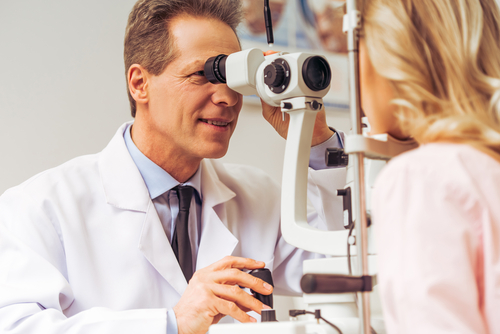
If you’ve put off making an appointment with an eye doctor because you’re nervous, knowing what to expect can help you feel at ease. In addition, leaving your appointment with information you can use daily to protect your eye health can also be beneficial.
Keep reading to learn seven questions to ask your eye doctor at your next appointment!
1. Why am I Given Eye Drops at my Eye Exam?
During a comprehensive eye exam, your eye doctor must look inside your eye. To accomplish this, the pupil, the dark opening at the center of your iris, must be fully dilated.
However, your pupils shrink when exposed to light. Dilating eye drops keep your pupil wide open so your doctor can see into your eye and examine the retina and optic nerve in the back of the eye.
Expect to have blurry near vision and light sensitivity for a couple of hours afterward.
2. Does My Vision Change Every Year?
While your vision changes as you grow from childhood to adulthood, and again as you and your eyes age, the rate of change is different for everyone. If you have good vision, you may not see any changes until you reach middle age.
If you schedule regular eye exams because you wear glasses or contacts, your eye doctor will tell you whether or not your eyes have changed enough to warrant a new prescription.
3. How Often Do I Need New Glasses?
Some adults need a new prescription every year, while others experience such slight changes that they can go two to three years until they need a new glasses or contact lens prescription. When you reach forty, you may see the beginnings of presbyopia which causes blurriness in up-close vision.
Reading glasses may be necessary as you grow older.
4. How Often Do I Need to Schedule Eye Exams?
According to the American Academy of Ophthalmology, if your eyes are healthy and your vision is good, you should have a complete exam by your ophthalmologist once in your twenties. In your thirties, you should have an eye exam at least twice.
Once you reach forty, you should begin to have regular eye exams. If you have vision changes at any age, an annual exam will ensure that your vision correction is up to date.
If you have a chronic health condition like diabetes or vision problems in your family, an annual eye exam is the best way to stay on top of vision health.
5. Am I a Good Candidate for a Vision Correction Procedure?
Your LASIK surgeon will have specific requirements that you will need to meet in order to qualify as a candidate for laser vision correction. They will likely require you to be eighteen or older, have a stable glasses prescription, and be in good health.
The only way to determine if you are a candidate for laser vision correction is to visit your eye doctor for a consultation.
6. Why Are my Eyes Dry?
Occasional dryness is common, but if your eyes are frequently red, itchy, burning, tearing, or sensitive to light, it could mean that you have dry eye syndrome. Your eye doctor can implement a treatment plan to improve your symptoms.
7. What Should I Eat for Vision Health?
Your eye doctor will inform you of foods and supplements that may be able to aid your vision health. It is known that Vitamin A supports healthy eyesight.
A diet rich in fruits, vegetables, beans, fish, and whole grains is good for overall health and your eyes.
Are you ready to see your eye doctor for an annual exam? Schedule an appointment at Metro Eye Care in Paramus, NJ, today!
